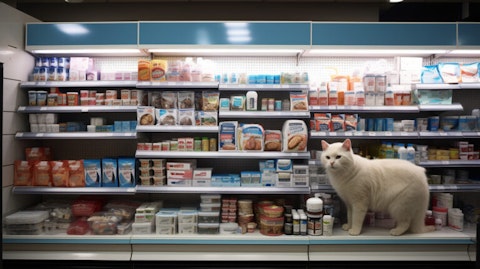We came across a bullish thesis on PetMed Express, Inc. (PETS) on Tiny Stock Ninja’s Substack by Tiny Stock Ninja. In this article, we will summarize the bulls’ thesis on PETS. PetMed Express, Inc.’s share was trading at $3.9 as of Oct 23rd.

A pharmacy counter stocked with diverse pet medications.
PetMed Express, Inc. (NASDAQ: PETS) is entering a potential turnaround phase after years of mixed performance. The company, which has historically been a cash-generative pet wellness business, has struggled recently due to mismanagement and increasing competition. However, with a new management team in place, led by CEO Sandra Campos, there are signs of renewed focus and operational improvement. Campos, who was appointed in April 2024, quickly returned the company to GAAP profitability within two months, signaling that the company may be on the verge of a recovery. PetMed Express sells a variety of pet products, including prescription medications, supplements, food, and other supplies, and has remained a relevant player in the pet care industry for nearly three decades.
Founded in 1996, PetMed Express initially built its business by offering a cost-effective alternative to veterinarians who charged high prices for pet medications. By 2005, more than half of its sales were generated online, and the company grew its reputation through catalog and TV marketing as 1-800-PETMEDS. Over the years, the company’s core business has remained relatively consistent, with flea, tick, and heartworm medications comprising a significant portion of revenue. Despite the growth of competition, especially from companies like Chewy, PetMed Express continues to offer a competitive product range.
Under the previous CEO, the company experienced missteps, including operational inefficiencies and strategic misalignments, such as allowing its PetCareRX business to compete directly with its core brand. Campos immediately began addressing these issues, focusing on customer retention and optimizing marketing efforts. Her strategy has shifted towards a balanced approach to customer acquisition and retention, while also exploring logical add-ons to the company’s core prescription business.
Two key initiatives being prioritized are AutoShip and the expansion of private-label prescriptions. AutoShip, which accounts for 56% of PetMed’s business, is viewed as an area for growth, and the company is introducing new features to make the service more flexible for customers. The private-label initiative is also promising, as it offers higher margins and cost savings for customers. Campos has engaged with the company’s veterinary advisory board to align product offerings with consumer needs, focusing on chronic pet health issues and preventative care.
Financially, PetMed Express remains a highly cash-generative business with minimal capex requirements. Despite challenges over the past few years, the company still holds $46 million in cash and has no debt, making it financially stable. Inventory levels fluctuate due to opportunistic purchasing, but turnover has averaged 7.5X over the past decade, indicating healthy inventory management. Revenue has been relatively flat since 2019, hovering around $280 million annually, though the company saw a temporary boost during the pandemic. Gross margins have stabilized around 27-28% in recent years after facing pricing pressure from competitors, but Campos’ efforts to cut costs and refocus on core operations are already yielding positive results. In fact, during her first two months, she managed to reduce general and administrative expenses significantly, slashing them from $15.7 million in the prior year to $4.9 million, including a reversal of stock compensation.
Looking ahead, the market opportunity for PetMed Express remains significant. The pet wellness industry has grown continuously over the last two decades, with U.S. spending on veterinary care and pet medications reaching $38.3 billion in 2023. This expanding total addressable market (TAM) provides ample room for PetMed to capture a larger share, particularly if it can capitalize on the operational improvements initiated under Campos.
PetMed Express (PETS) is currently trading at about 5.5x next-twelve-month earnings, with an annualized EPS of $0.72. Historically, the company has traded between 12-22x earnings, suggesting significant upside potential. A conservative 12x multiple would value the stock at $8.64, representing a 117% gain. Alternatively, using EBITDA multiples, assuming 10% margins on $270M in revenue, PETS could achieve $27M EBITDA. Applying a 6x multiple, the stock would still offer around 100% upside. Rumors of a potential sale further boost the valuation case, with recent pet industry acquisitions valuing companies at 15x EBITDA. Risks include intense competition and a new management team, but the company is already showing profitability and cost savings.
PetMed Express can see potential growth by concentrating on its main pet pharmacy services and managing expenses effectively. By optimizing operations and focusing on its core competencies, the company can provide notable benefits for investors. Having said that, when we went through its latest earnings call, it didn’t sound like the company is going to become profitable very soon. They blamed the 13% topline decline on “macroeconomic pressures” and they had a negative EBITDA during the quarter.
PetMed Express, Inc. is also not on our list of the 31 Most Popular Stocks Among Hedge Funds. As per our database, 17 hedge fund portfolios held PETS at the end of the second quarter which was 14 in the previous quarter. While we acknowledge the risk and potential of PETS as an investment, our conviction lies in the belief that some AI stocks hold greater promise for delivering higher returns, and doing so within a shorter timeframe. If you are looking for an AI stock that is more promising than CL but that trades at less than 5 times its earnings, check out our report about the cheapest AI stock.
READ NEXT: Analyst Sees a New $25 Billion “Opportunity” for NVIDIA and 10 Best of Breed Stocks to Buy For The Third Quarter of 2024 According to Bank of America.
Disclosure: None. This article was originally published at Insider Monkey.


